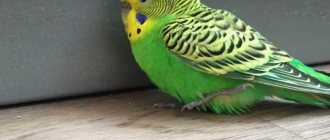- home
- Parrot
- FAQ
04/22/2019 Is your parrot constantly screaming? It's not clear what he needs? Do you want to stop bird concerts? Screams may be natural for them, but they disturb the people around them!
Why does the parrot scream
In natural conditions, birds are very active: they look for food, go to watering places, exchange news and, naturally, scream in the morning and before sunset. Their domestic relatives, for the most part, do the same, especially if their owners regulate their daylight hours.
But natural instincts do not always dictate behavior. There are several reasons why a parrot screams:
- the bird reacts to the chirping of birds outside the window. The sounds he makes at the same time are similar to a call, he is trying to shout out to them;
- the pet is afraid of you - this is more typical of wild, untamed birds, although often a seemingly tame parrot in a pet store begins to scream when you, having brought it home, approach the cage. He can scream even at night, frightened by the headlights or noise outside the window;
Important! When afraid, your parrot may scream in an attempt to scare you away and force you to stay away from it. This is where patient taming your pet will help you. Gradually the bird will stop screaming, frightened by any movement, noise and your approach.
- a bird may be afraid or indignant when it sees a cat, dog, or stranger next to it - in this case, it expresses its displeasure or fear by screaming;
- Often, with a loud voice, a pet can signal that it is hungry. Check if there is food in the feeders and if you gave him greens and vegetables today;
- Many birds demand to be let out of the cage for a walk in this way;
- Often birds are jealous of their beloved owners of other household members and by screaming they try to win attention or intimidate a rival;
- There are also parrots that scream loudly, knowing that the owner is about to leave on business, leaving him alone. These are very social birds, they feel deeply sad when no one is with them.
Attention! Don't make your pet suffer from loneliness. If you don’t have time to exercise and communicate with him, or don’t get a parrot at all, or find a solution to the problem: at a minimum, leave the radio or TV on, or at the maximum, get him a mate.
If the parrot screams and screams, although there is no reason for this (there is food in the feeders, toys in the cage, the bird is often outside the cage and is not deprived of your attention), it is quite possible that the pet is in pain, you should contact a veterinary clinic .
The essence of the problem
The appearance of a parrot makes some adjustments to the breeder’s everyday life. Proper care of birds requires daily cleaning of the enclosure, as well as changing water and food. Incorrect living conditions, lack of disinfection, imbalance in diet lead to various pet diseases.
An inexperienced owner should know that after purchasing a parrot, the bird goes through an adaptation period. Depending on the nature and type of bird, this period takes different times. On average - 14 days.
Popular articles Puppy imitates a rooster: funny video
Transportation, sudden changes in living conditions and usual food put the parrot under stress. All birds have different reactions to moving. Some people tolerate it easily, while others experience an attack of hyperactivity. At the same time, the parrot rushes around the cage and screams loudly.
In order for your pet to quickly get used to new conditions, the surrounding world and people, you need to ask the seller in advance what the parrot eats. The presence of a favorite treat in the cage can make the bird happy, which will help calm it down.
The most screaming parrots: how different species scream
Before you get a pet, you should consider your options. In particular, how will your neighbors or relatives react to noisy birds. Moreover, there are breeds that are particularly loud.
Macaws are not only the loudest screaming birds, but also require special conditions of detention. It is not easy to keep them in a cage, as there is always a risk of damaging the beautiful plumage of the long tail and wings. In addition, with their powerful beaks, these birds love to chew on everything. Listen to how a macaw parrot can scream and think whether you will be able to listen to this “music” for many decades:
Solar aratings are much smaller in size than macaws, but they are not inferior in volume. The calls of these parrots can be heard at a distance of two or more kilometers. Don't believe me? Listen for yourself:
The cockatoo is another screaming parrot. Its advantages: graceful beauty, amazing artistry, affection and immense affection for its owner. But their shrill screams can drive sensitive people crazy. Listen to the cockatoo parrot scream:
Amazons are very loud, but their strong advantage is their excellent ability to reproduce human speech. They easily grasp words and sounds, so it is better to watch what you say so that one fine day your pet does not surprise your guests and yourself with a rich vocabulary.
The necklace parrot , despite its medium size, can scream very loudly and shrilly. Moreover, it is rather an ear-piercing screech with which he tries to shout over everyone. It is his voice that is the most recognizable in the vastness of South Asia:
The African gray parrot is popular for its onomatopoeic ability. These birds perfectly remember words and entire phrases, a wide variety of sounds. The most amazing thing is that sometimes it seems that they understand what they are talking to you about. However, few people know that these parrots can scream very loudly:
Cockatiels are not the quietest parrots. They make sharp, monotonous sounds - this is when the birds are in a good mood, but if something does not suit them and they decide to scream, then the scream will be loud. They also know how to be funny and indignant, judge for yourself:
Lovebirds are beautiful, cheerful and sociable birds that also don’t mind making noise, although the sounds they make are not screams, but a piercing, ringing chirping that feels sharp and sharp:
Budgerigars are also quite noisy birds. Due to their small size, they may not be as “loud” as larger species of birds, but their chirping does not always bring pleasure to their owners. These nimble birds can scream for any reason and in different ways:
- when they are dissatisfied with something or quarrel with their brothers, they make abrupt, sharp sounds;
- when they are bored, try to attract attention, want to leave the cage or ask for food, they chirp abruptly;
- the male attracts the female by singing and clicking;
- when they communicate with each other or are glad to see you, they chirp melodiously;
- They are excited about something, they are afraid - they scream for a long time.
Description of birds
This is one of the most common living creatures kept in the house. Exotic, colorful plumage, active, inquisitive, cheerful birds.
Description of parrots and the reasons why they constantly scream
There are many different types and sizes. There are many advantages of their content - they do not take up much space, they please the eye with their outfit, they repeat individual words and even phrases of human speech, simple melodies, and fill leisure time. At the same time, without particularly bothering the owner with the troubles of its maintenance. And feeding, with the current assortment of grain mixtures in pet stores, also does not become a problem.
But among the disadvantages of having parrots in the house, the most important is the noise these creatures produce.
How to stop a parrot from screaming
First, you need to observe your pet to understand the reason for the screams. Keep a diary and meticulously record the time when the bird began to scream, what preceded it, the duration and tone of the cry (anxious, demanding, hysterical). Eliminate the cause, and relative silence will reign in your home.
If your pet has developed a bad habit, there are several ways to stop your parrot from screaming:
- A wild bird will need to be trained to be handled, which will take time and patience. Having become accustomed to her surroundings and feeling safe in her home, she will become calmer.
- If your pet demands something from you (let him out for a walk, give him food, communicate), you should not immediately rush to fulfill his desire, otherwise this will develop incorrect behavior patterns. You need to do the opposite: accustom him to the fact that you communicate with him, feed him and let him out of the cage only if he behaves well. Don't forget to reward your pet's good behavior.
- You will have to be patient to teach good behavior to a constantly screaming parrot. You must ignore his cries if he is trying to get your attention out of capriciousness. If you start yelling at him or just looking at him with displeasure, this will be a signal to continue. Silently leave the room and enter it no earlier than the bird has fallen silent and remains silent for at least 10 seconds. Immediately reward your pet with a treat for behaving well. Be prepared that at first the parrot will try to scream louder to attract your attention, but pretty quickly he will understand that screaming has no effect on you and will calm down.
- Don't wait for the bird to demand something from you. If you study it well, you will know when to let it out of the cage, when to give food, when to communicate, even before the parrot starts screaming.
- If you do not want your pet to make noise in the mornings and at night, cover the cage with a thick, breathable fabric.
- Get a couple for your screamer - if the reason for yelling is a feeling of loneliness. If you still have one parrot, do not forget to leave the radio or TV on when leaving home. Provide him with a lot of different toys so that the bird does not get bored until you return.
- Constantly communicate with your pet, tell them how your day went. Parrots are very sociable and sensitive natures; they will sense your state, mood, and even “read” the facial expressions on your face.
- Try to do everything you can to keep your bird from feeling stressed. There are frequent cases when these gentle creatures died from cardiac arrest due to severe fright. Let this not happen to your pet.
- Don't stop your parrot from screaming at least from time to time. Choose times when it won't bother you or others. Then it will be easier for you to teach your pet to be quiet at other times.
- If you have a particularly screaming parrot in your house, talk to it quietly and measuredly, teach it to whistle quietly. In an effort to hear you, the bird will fall silent and gradually begin to imitate your measured conversation.
The most noisy parrots: the nature of the cry and its reasons
Many bird owners note that the most noisy of them are cockatiels and budgies.
Corella screams all day long
Corellas are one of the most talkative species of parrots. Moreover, their sounds, already quite sharp, can develop into an almost unbearable scream.
Most often, this happens to wild or overly spoiled individuals.
- If you get a wild parrot, you need to be patient to train your feathered pet. Having gotten used to you and the new environment, he will begin to behave calmer.
- In the second case, only a competent reaction to his cry will help. You should not run into the room at the first call of the cockatiel - on the contrary, he must understand that they approach him, let him out for a walk, or give him food only when he behaves well. And such behavior should be encouraged in every possible way.
What you should never do
Raising a parrot is like raising a small child. Any errors then have to be corrected, spending a lot of time and effort. Therefore, try not to make these mistakes right away:
- do not shout at the parrot, by shouting you only provoke the bird, it will try to out-scream you, and the louder you shout, the louder it screams;
- do not hit the cage with your hands - this is extremely stressful for the bird; it will not stop making noise, but will begin to be afraid of you, your hand, and will no longer feel safe in its home;
- if the pet starts screaming, do not try to coo with it or give it a treat - this way you encourage incorrect behavior, the parrot understands that you can get all sorts of pleasant things out of you by screaming, and will begin to control you;
- when leaving the TV on, make sure that it is not a channel about animals - the bloodthirsty screams of wild animals can greatly frighten your pet;
- some owners start splashing water on a screaming bird, sometimes this helps to calm it down, sometimes it worsens the situation. It's one thing when you give a parrot a shower, trying to divert its attention, but another thing when you try to shut it up with water. The bird senses your attitude and reacts to it accordingly.
Yes, parrots scream whether you like it or not. These are noisy pets, and for them screaming is a way of communicating. A silent and quiet bird is a sick bird. How you raise your pet will determine whether you will enjoy interacting with him or be ready to run away from home. Love your pets and they will love you back.
Gout
The disease occurs due to overeating homemade food from the table. The disease can be recognized by characteristic nodules on the joints of the paws. This defect causes severe discomfort. The bird experiences pain when moving. Associated symptoms are:
- lethargy;
- constant presence at the bottom of the cage due to the inability to stand or sit on a perch;
- decreased appetite;
- at a later stage, loose and profuse stools appear.
During gout, your parrot may experience bouts of hyperactivity. The parrot runs along the bottom of the cage, makes various sounds, and then falls again and continues to sit lethargic and sick. The disease is difficult to tolerate. Due to the frequent manifestation of the disease, the disease becomes chronic.
To alleviate the pet's condition, vitamin complexes are included in the diet. The balance in food is clearly maintained. Protein foods of animal origin are excluded.
In severe cases of gout, surgical intervention is used to remove the nodules. During the procedure, a lump on the joint is pierced with a sterile needle and the accumulated fluid is squeezed out. Such actions make the life of the bird much easier.
A caring owner must clearly distinguish the nature of the hyperactivity symptom. If this is a temporary manifestation, then do not worry. It is necessary to pay more attention to the pet and understand what he wants to change. An active, energetic bird means healthy.
Some behavioral features
Parrots express their emotions not only by screaming and gnashing. Even yawning, raising your tuft or standing upside down will tell you about them.
Raising the crest
For cockatiels, this movement is similar to how humans raise their eyebrows. This happens during times of great surprise, fear, and confusion. The bird raises its crest and hisses during intense fear. And anything calls it:
In addition, the pet raises its crest when upset or angry. In such cases, it is not recommended to approach the cage closely. It is better to talk carefully and calmly with the parrot and try to calm it down.
Hanging upside down
When a parrot hangs upside down and at the same time spreads its wings in different directions and fluffs its tail, this often leads to bewilderment of owners. In this position, he can actively flap his wings. In this unusual way, the bird communicates to others its desire to swim and splash in the water.
If the female sits on the eggs and also flaps her wings, in this case she is protecting her home. Such warnings indicate a possible attack if danger arises or comes close to the cage.
Yawn
Cockatiels yawn for several reasons:
Important! A parrot's warm paws indicate its health.
But if yawning is accompanied by head shaking, you need to watch your pet. Such symptoms are characteristic of respiratory diseases, problems with the respiratory tract, and the development of infections.
Playing sounds
The calls of parrots differ in volume, tone, frequency and other characteristics. They determine the bird's mood and even the reasons for such behavior.
Original scream
This breed of parrot is distinguished by its noisiness. Therefore, there can be many reasons why a cockatiel yells. Birds often call in the mornings and evenings, during dawn and dusk. Many of them shout to warn their owners about danger or share their desires with them.
Some cockatiels may scream because they are missing their brethren. Such sounds are usually monotonous with notes of sadness. But in case of prolonged screaming, you need to pay attention to the pet and try to understand the reason:
A short cry is a natural behavior of birds. But screaming for more than two hours should alert the owners. Any changes that are not typical of the cockatiel’s usual behavior are a reason for close attention and action.
A peculiar creak
If a parrot makes a peculiar creaking sound with its beak, this is normal. In this way he communicates his pleasure. These sounds are often observed after meals or before bed.
Interesting! The parrot calms itself when it creaks its beak.
Beak Gnashing
This sound is characteristic of cleaning the beak or grinding it down. The branches of apple, willow and other trees act only as chewing toys. They are not suitable for grinding. A piece of chalk or sepia can help your pet in this matter.
Birds singing is a way to distract from screaming
If you are unhappy with your parrot constantly screaming loudly, try playing music for him. The feathered one will be distracted by the music, his attention will be occupied. By periodically playing the same piece of music, you can teach your parrot to sing songs. When a smart bird hears the same words over and over again, it repeats them, picking up the intonation. Singing is both fun and a great alternative to screaming.
Parrots use their screams to express their emotions, communicate and transmit signals. If you feel that your pet’s behavior is outside the norm, look for reasons not only in him, but also in yourself. Your own balance is the key to a good relationship with a bird.
Be consistent and patient. Remember, patience and work will grind everything down? But don't expect the impossible from your pet. Birds by their nature are quite noisy creatures, they communicate by screaming, this is how they express their approval or dissatisfaction, and you need to learn to accept this!











